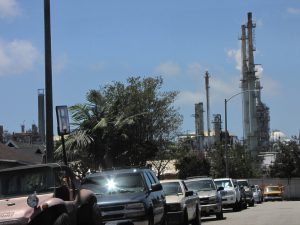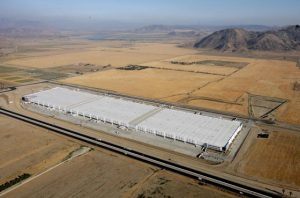2021 has dawned as a significant moment for air quality. After four years of the pro-polluter Trump Administration, President Joe Biden has pledged to put environmental justice at the front of his climate policy. Meanwhile, California Governor Gavin Newsom has proposed a bold state budget plan that, if passed, will invest $1.5 billion in to putting the cleanest trucks, buses and cars on the road.
Yet, good news from Washington and Sacramento does not mean Southern Californians can breathe easy. Southern California is home to some of the dirtiest air in the nation. In 2020, Los Angeles experienced the worst smog in decades. This underscores the urgent need for all levels of government; federal, state and local, to make and enforce tougher rules as well as incentivize clean technology. This includes the South Coast Air Quality Management District (SCAQMD), which will be ground zero for two major air quality battles later this year.
Taking on warehouse pollution
When you think of things that create pollution, what do you think of? Most people would say factories, refineries, power plants and vehicles. Also important, however, are facilities that attract trucks, trains, ships, and planes, as well as cargo handling equipment. Almost all freight vehicles are powered by diesel fuel, which not only produces smog-forming emissions but also carcinogenic diesel particulate matter. Freight facilities like warehouses, railyards, ports, and airports act as magnets for toxic diesel exhaust.
Due to Southern California’s role as a global transportation hub and the growth of e-commerce, the warehousing industry is experiencing a massive boom. Unfortunately, many communities, particularly those along the supply chair corridors from the San Pedro Harbor area to Southeast Los Angeles and east to the Inland Empire, are suffering from this boom. More warehouses mean more truck traffic and cargo-handling equipment, ultimately resulting in more pollution. Three-quarters of the air toxics cancer risk in the South Coast Air Basin is from diesel particulate matter. This risk is even higher for communities near goods movement facilities and transportation corridors. People who live, work, learn and play near goods movement facilities and travel routes are subsidizing the global economy with their health and quality of life.
Advocates have pressed SCAQMD to tighten rules over the goods movement industry for decades. This demand may finally become reality when the SCAQMD Governing Board considers a warehouse pollution rule in April. The measure, Proposed Rule 2305, would establish a minimum number of points large warehouses (over 100,000 square feet) would have to earn. Warehouses can earn points by serving clean trucks, installing charging and fueling infrastructure and implementing other options. Warehouses can also pay a fee, which would help fund programs dedicated to reducing warehouse pollution.
How you can help reduce warehouse pollution
Passing a strong warehouse pollution rule would be a major victory for air quality and environmental justice. For this reason, community and environmental advocates are demanding the proposed rule be even stronger. SCAQMD should create a rule that considers the impacts on communities near warehouses and other pollution sources. Further, the new rule must not create loopholes or rely on “paper compliance” – reducing pollution on paper but not in reality. Not only would a strong warehouse pollution rule reduce emissions, but it would create a precedent for new regulations for ports and railyards.
That is where you come in! Most members of the SCAQMD Governing Board are city council members and county supervisors from the four-county region. In addition, the Speaker of the Assembly, Senate President pro Tempore and the Governor appoint members to the Governing Board. You can contact AQMD by emailing FBMSM@aqmd.gov and demand they pass a strong rule to reduce warehouse pollution and consider local community air quality. You can also contact the members of the SCAQMD Governing Board by email or on their individual social media accounts (see below.) Your voice is vitally important in passing a strong warehouse pollution rule.

Cutting smog through stricter rules on refineries
Oil refineries are also a significant source of air pollution in Southern California. More than half of California’s oil refining capacity is in Southern California. In Los Angeles County alone, there are six major oil refineries – four of which are in the communities of Carson, Wilmington, and San Pedro. Sadly, these are predominately low-income communities and communities of color. Further, other major sources like ports, freeways, rail yards and factories also pollute these communities.
It comes as no surprise that refineries are among the largest polluters in the state, with a wide variety of emissions. Some of these emissions – specifically oxides of nitrogen (NOx), create smog. For decades, SCAQMD has tried to regulate NOx through a regional credit-trading system. Over time, however, this market-based system failed to reduce emissions as effectively as traditional command and control regulations. Faced with a looming federal air quality standard deadline and pressure from new laws, SCAQMD is now updating its refinery rules.
Despite state law requiring pollution control technologies on large emissions sources and a 2023 air quality attainment deadline, progress on Rule 1109.1 has been difficult. Originally scheduled for approval in late 2019, Rule 1109.1 is set to be voted on June 4th. This nearly two-year delay is due to opposition from the oil companies, as well as the pro-business contingent on the SCAQMD Governing Board. Even if the regulation passes, however, it will not be fully implemented until mid-2029. This is five-and-half years after the deadline to deploy pollution control technologies set by state law.
Where do we go from here?
Though the details of Rule 1109.1 are still in flux, there is some cause for cautious optimism. CCA and other environmental and community advocates continue to press SCAQMD to pass a strong refinery rule. Further, new SCAQMD Board Members are slowly tipping the balance of power towards environmental and community protection. Yet, as with the warehouse rule, SCAQMD Board Members need to hear from you. Email the SCAQMD Board Members demanding a strong refinery rule. You can also attend the next public workshop for Rule 1109.1, which will be on February 4 at 1 p.m.
Both the warehouse pollution rule and refinery rule will be tough to get passed. But SCAQMD is running out of options to meet its air quality requirements. We can make 2021 a landmark year for air quality in Southern California. And the truth is, we must.
Contact your South Coast AQMD Board Members!
The SCAQMD Board Members need to hear from you, not the freight or oil industries. Tell SCAQMD you support strong rules to reduce pollution from warehouses and oil refineries.
Speaker of the Assembly appointee
William Burke, SCAQMD Chair
Email: mwpatrick@aqmd.gov
Cities of Riverside County
Ben Benoit, SCAQMD Vice Chair and Mayor Pro Tempore, City of Wildomar
Email: bbenoit@cityofwildomar.org
Orange County
Lisa Bartlett, Supervisor, Fifth District
Email: lisa.Bartlett@ocgov.com
Twitter: @OCSupBartlett
Facebook: @LisaBartlettOC
City of Los Angeles:
Joe Buscaino, City Council Member, 15th District
Email: jenny.chavez@lacity.org, jacob.haik@lacity.org
Twitter: @JoeBuscaino
Facebook: @JoeBuscaino
Instagram: @joebuscaino
Eastern Los Angeles County Cities
Michael A. Cacciotti, Mayor Pro Tempore, City of South Pasadena
Email: macacciotti@yahoo.com
Senate Rules Committee appointee
Vanessa Delgado, State Senator (ret.)
Email: vdelgado@aqmd.gov, shernandez@aqmd.gov
Twitter – @_DelgadoVanessa
Governor’s appointee
Gideon Kracov
Email: gkracov@aqmd.gov
Twitter: @GKracov
Los Angeles County
Sheila Kuehl, Supervisor, Third District
Twitter: @SheilaKuehl
Facebook: @sjkuehl
Instagram- @sheilakuehl
Cities of San Bernardino County
Larry McCallon, Mayor Pro Tem, City of Highland
Email: lmccallon@cityofhighland.org
Riverside County
V. Manuel Perez, Supervisor, Fourth District
Email: vmanuelperez@rivco.org
Twitter: @SupVMPerez
Facebook: @VManuelPerez4th
Instagram: @supervisorperez
Western Los Angeles County Cities
Rex Richardson, Council Member, City of Long Beach (term begins 2/5/2021)
Email: Matthew.Hamlett@longbeach.gov
Twitter: @RexRichardsonLB
Facebook: @rexrichardsonlb
Instagram: @rexrichardson
Cities of Orange County
Carlos Rodriguez, Mayor Pro Tem, City of Yorba Linda
Email: crodriguez@yorbalindaca.gov
Twitter: @carlos_yorba
Facebook: @rodriguez4yl
Instagram: @rodriguez4yorbalinda
San Bernardino County
Janice Rutherford, Supervisor, Second District
Email: supervisorrutherford@sbcounty.gov; dsmgba247@gmail.com
Twitter: @JanRutherfordCA
Facebook: @SupervisorRutherford
Instagram: @janice_rutherford








